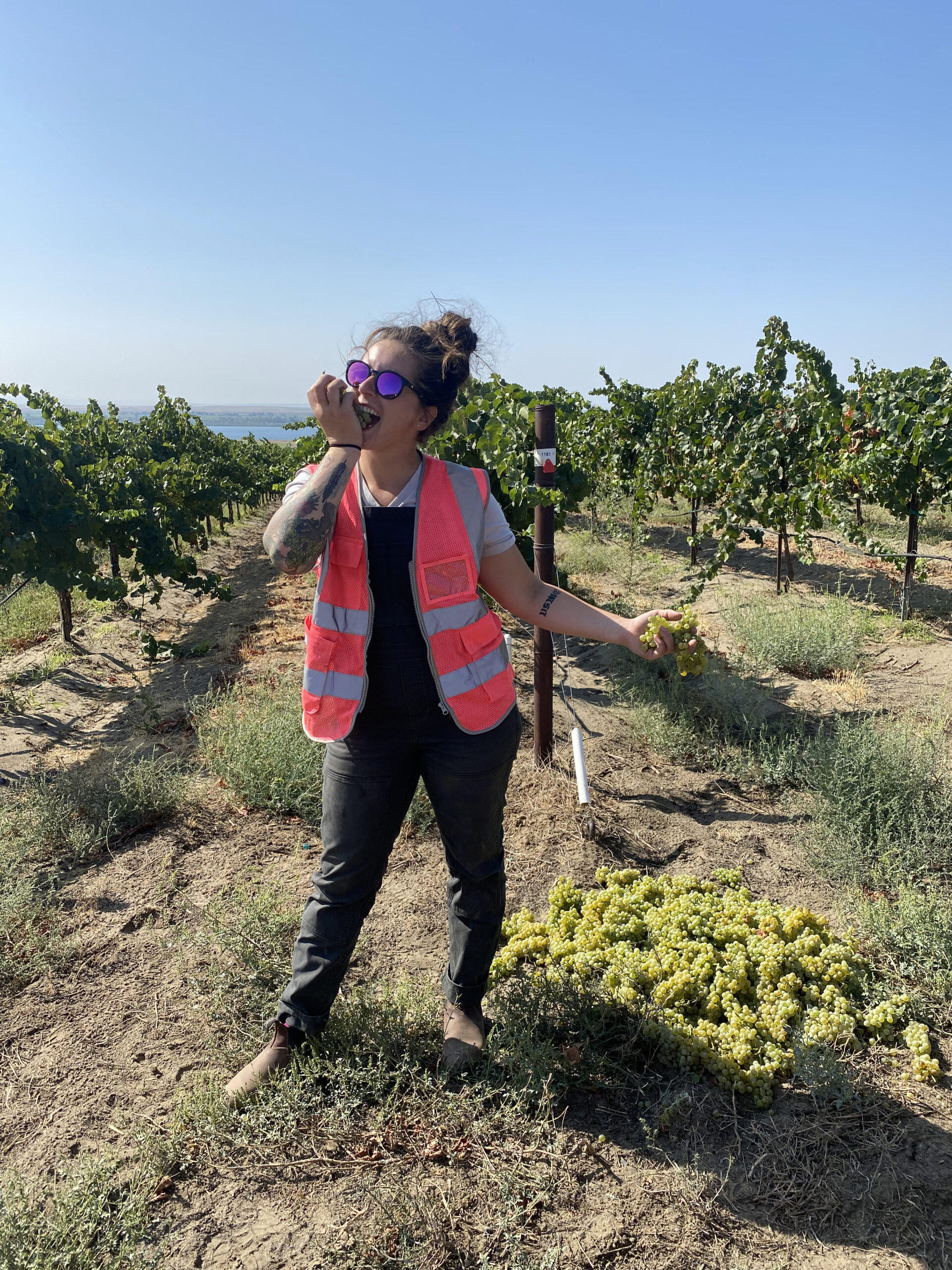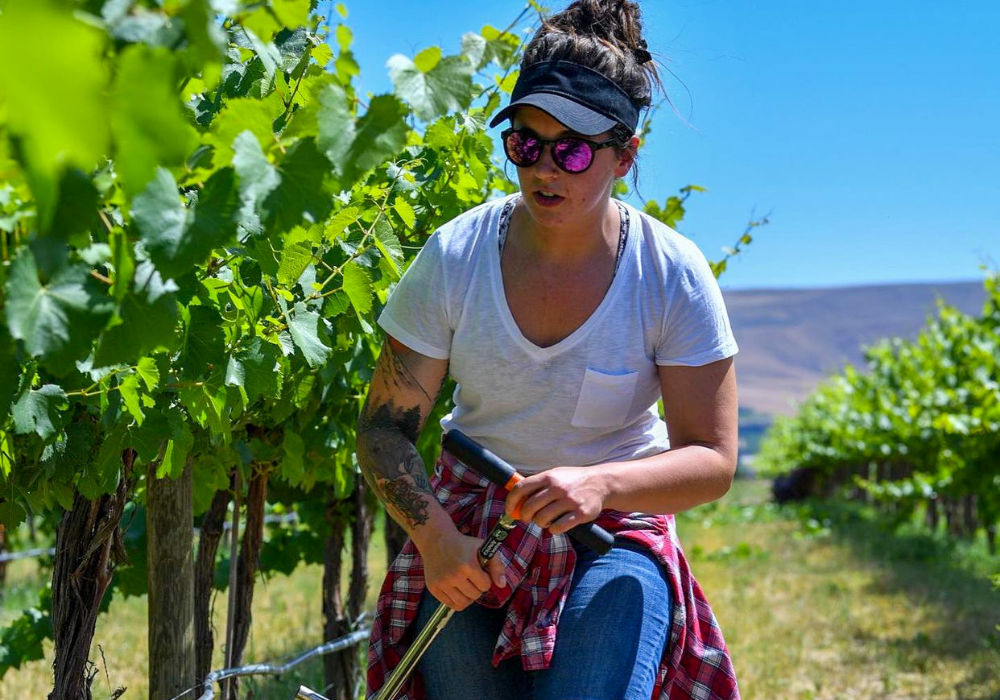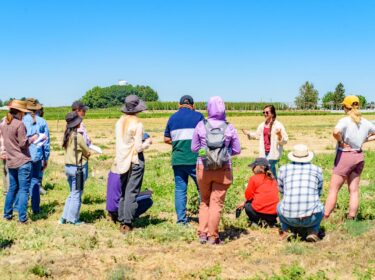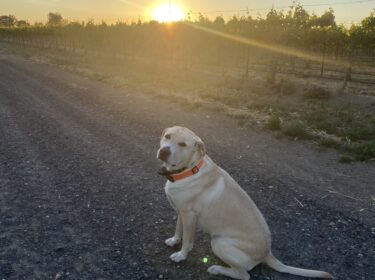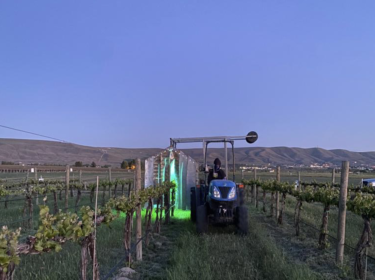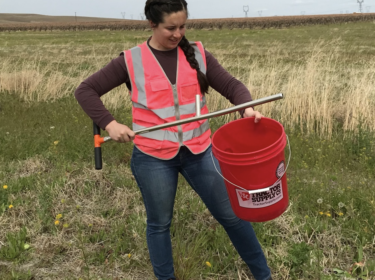“No es sólo para las uvas. Corresponde a la agricultura en su totalidad.”
Meet Bernadette Gagnier, Marines veteran and PhD Candidate at WSU’s Viticulture & Enology Program. While so many of our ambassadors work in the vines, Bernie’s work focuses on making all of that work in the vines possible, now and in decades to come. “All of our work, even though my degree will be in horticulture, revolves around grapevines or winery systems in some form.” It gets specific real fast: “My work is in alternative strategies for nematode management in vineyard replant and preplant scenarios. I also work with cover crops, biofumigants, and fumigation replacements.” But as she tells us, it’s not just for grapes.
I never have a schedule. I do anything under the sun that has to do with vines.—Bernadette Gagnier
Translated by Laurita Angulo
Washington Wine: Let’s dive into it. Tell me a little bit about you and your work in the vines.
Bernadette Gagnier: I’m Bernadette, but I go by Bernie. I am a PhD Candidate at WSU, all of my research is out at the Prosser Research Station. Dr. Michelle Moyer is my Advisor, and I have Dr. Tom Collins on my committee, Dr. Inga Zasada with USDA from Corvallis, as well as Dr. Deirdre Griffin-LaHue and Dr. Lisa Wasko DeVetter from WSU in Mount Vernon Washington.
Even though my degree will be in Horticulture, all of the work that the lab I am in does revolves around grapevines or relates to wine in some form. My project, specifically, is alternative strategies for nematode management in Washington State vineyards. I work with cover crops, biofumigants, fallow ground and some other ways that we can reduce the chemicals that are going into the ground for nematode management, as well as a bunch of other benefits that we have from it.
That’s what I’ll be working on for the next few years. I actually started working for Dr. Moyer in undergrad. I graduated from WSU Tri-Cities with my degree in Viticulture and Enology in spring of 2020. I immediately started what was a Master’s degree, but I’ve since converted to a PhD. I got lucky in that regard. I was there early and really got into it. Now, I’ve finished collecting my second season of data.
WW: Tell me a little about the work you do with Michelle and when that all began.
Bernie: I started working for Michelle in spring of 2019. All nematode, vineyard-related work. She applies for different grants that go in cycles with the students she has working for her. There are different organizations and commissions that fund these projects, including the Washington wine industry. By the time I got there, she already had some funding for nematode research, so I am the nematode girl now. And I say, “the nematode girl,” because there was another grad student before me, now Dr. Katherine East, also female, and she was the nematode graduate student before me, so I received the torch from her.
I started as a Master’s student after undergrad. I feel really, really passionate about what I’m doing. I think it has a big impact and not just in wine grapes. I definitely love working with cover crops. More and more people are asking about the work we’re doing. “Is there one that has a purpose out there instead of just water management?” I have all these cover crops with different benefits. They’ll reduce your nematode populations. They’ll scavenge nitrogen, so plant them at the end of the season, and then they’ll release that back into the soil, rather than it just getting degraded. They’ll stop compaction, they’ll add organic matter, nitrogen fixing, other beneficials for pollinators, and all sorts of things.
More and more people are asking about the work that we’re doing.—Bernadette Gagnier
This gets technical quickly, but I also have a fumigation replacement cover crop. We have one year of data and it was nearly as successful as traditional fumigation and we didn’t use any chemicals. The most I had to do was try and stave off some beetles that were trying to eat my cover crop. It was really, really encouraging to get that data. I felt so strongly that I didn’t want to just finish my Master’s and then watch somebody else that didn’t want this project come and finish it up, so I decided to stay and get my PhD. I just decided that in May of 2021. I remember telling Dr. Tom Collins, who is on my committee, “I think I’m going crazy, because I think I’m going to stay for a PhD.” And that led me to where I’m at now.
My goal is to be a Vineyard Manager. I don’t need a PhD to do that. This advanced degree is just for me and for my own check in the box. I know that this will have impacts, not just in the wine industry, but in horticulture and agriculture altogether. The Litchi Tomato—a crop I’m working with, for example—they’re doing work on it in potatoes with University of Idaho right now. And it’s really successful in potato. It’s working really well in grapes, but it’s not just for grapes; it’s for agriculture as a whole to reduce a lot of the chemicals we put in the ground.
It’s not just for grapes; it’s for agriculture as a whole to reduce a lot of the chemicals we put in the ground.—Bernadette Gagnier
WW: There’s so much unseen work that goes into grapes and wine. And it hits so many parts of life, from crop to culture to consumerism.
Bernie: Precisely. It’s so important. I work with people that are doing really cool things. I work with my friend Lexie, who’s getting her PhD, also with Dr. Michelle Moyer, in alternative methods for the management of powdery mildew in wine grapes, and I help her all the time with her UVC treatments. It’s this very bright UVC light apparatus that we use in the vineyard, similar to a more traditional sprayer. Everybody’s excited about it because it’s a bright, shining optical. Almost like a tanning bed that she pulls over the vineyard rows behind a tractor. I’m actually going tonight to help her from 8:30pm until whenever we are done for the evening. We turn on the lights, pull it over different treatment rows, and she’ll take all the measurements and collect data throughout the season and into the fall.
WW: Is your everyday always changing?
Bernie: Yes, [laughs]. I get overwhelmed especially in the spring and summer when we have a lot going on the research side of things. A friend suggested I make a to-do list, but most days, I’m all over the place. Today, I weed-whacked for three hours. The other day, Lexie and I presented at a WSU Field Day, which are open to the public. We had 50 industry personnel come. It was the first extension event that Lexie and I got to present at. That was last Thursday, but on Wednesday, we went down to Walla Walla and soil sampled all day. I‘ve soil sampled at vineyards all over eastern Washington.
My day-to-day is always different. Some days I am in a lab looking through a microscope and counting juvenile nematodes. We do everything from pruning to harvest. I don’t do any winemaking, but we do Brix, pH, TA, and the like for research. We do a bunch of individual data collection. It’s usually vine-by-vine, or treatment-by-treatment. The tedious work that goes into it can be brutal. Last year, I did nematicide trials. I was finishing up trials from a previous grad student, so I would apply a nematicide and then 30 days later, I would go back and sample to see if it got any better. Everything is for reducing the chemicals that we use. All of Dr. Moyer’s projects are for reducing the amount of chemical input. We never have a schedule.
WW: So there’s no such thing as a 9-5 in agriculture.
Bernie: Exactly. For researchers, harvest isn’t as crazy, because we’re just collecting the data we’ve worked for up to that point. But we’ve been working our butts off and had some pretty crazy work weeks since May. The other day, the sun was setting around 6:30pm. We were like, “Oh, my gosh. It’s starting to set early.” And, “Wow, just another month and a half and we’ll get to relax a little again.” I love harvest because I worked in the industry before moving into research. It’s the most rewarding part of the year. But it’s fast, hard, in a hurry, and you’re exhausted, but you feel really good at the end of it.
Harvest is the most rewarding part of the year. It’s fast, hard, in a hurry, and you’re exhausted, but you feel really good at the end of it.—Bernadette Gagnier
WW: What was your journey into wine, and specifically Washington wine, like?
Bernie: I grew up in the Woodinville area. I was born in Redmond and then raised in Maltby. I went to Monroe High School, and I worked at the Gold’s Gym in Woodinville all of high school. I did just a little over a year of community college after high school. I didn’t love it. My counselor at the time asked, “What are you doing?” I was taking Political Science of the Middle East and North Africa and Japanese classes, and my English class was Irish History Literature. I was trying to find something to catch my attention, and none of it worked.
I did a year of college and then I was actually in the Marine Corps for five years. Military has been in every generation in my family. My brother was a Marine Corps Reservist. I thought that that was how I was going to pay for college. I also thought I was going to join the Air Force. They told me I was in pretty good shape, that it would be pretty easy for me and I thought, “If I’m going to join the military, I don’t want it to be easy.” So I joined the Marine Corps. I wanted extreme, I guess.
I was in the Marine Corps for five years. Military has been in every generation of my family.—Bernadette Gagnier
I was stationed in Okinawa, Japan, Quantico, Virginia, and then Camp Pendleton, California. While I was in California, I was part of a joint Navy Marine Corps Unit and we were on a Navy ship that is about three-quarters the size of an aircraft carrier. We had Harriers and helicopters on it. We went to 13 different countries in seven or eight months. When I got back, I only had a month and a half left on my contract. I had extended to do that float because I was in charge of the Marines in my shop at the time. It went from a four-year contract to a five-year contract. When I had a couple months left, I thought I wanted to be a nurse. I still didn’t really know what I wanted to do, but I figured that if I didn’t have a passion, I should help people. With the credits I had from before the military and all the credits from the Marine Corps, I was applying for nursing school, and I only had anatomy and physiology classes left to take. I was right there, but I realized, “I don’t want to do this. I really don’t want to do this.”
I ended up Googling “plant science degrees in Washington State,” and I found the one at WSU. I remember a kid from high school said he was going to WSU for Wine Science. And I was like, “How do you know you want to do this when you’re 15?” I didn’t want to be 25 years old going to Pullman, so I drove to Tri-Cities on July 13th and by August 1st, I had moved there. I toured the campus and just knew: “Yep, this is what I’m going to do.” I got accepted, I moved August 1st, and classes started around August 15th.
WW: You bring a whole lot of life and a lot of living to the vines. You mentioned a few words earlier that I want to focus on. Tell us about your work with nematodes.
Bernie: Nematodes are their own class of animals. Kind of like tardigrades, the water bears that you get to look at in biology in high school or college. They’re multi-cellular animals. There are more nematodes than all humans, other mammals, and everything else we know combined. That will be what outlives everything. And there’s more beneficials than there are not beneficial ones. A lot of the good ones eat bad nematodes, bacteria, fungi, and other bad things in the soil.
Nematodes will be what outlives everything.—Bernadette Gagnier
I work with plant parasitic ones. They are one of the smallest groups of nematodes, but they cause the most detrimental damage in so many crops, like potatoes and carrots. Here in wine grapes, it is slow vine decline that you see from nematode damage because it’s a perennial crop. But on annual crops, like potatoes, they can wipe them out much quicker. There’s so many really, really devastating effects from plant parasitic nematodes in other crops. For newly-planted vineyards, your decrease of yield and just the loss of your vines is what we’re trying to mitigate.
I am working to find, stop, and kill the Northern Root-Knot nematode. They are sedentary endoparasitic nematodes. They move through the soil as juveniles, and once they find a root that they like, they pierce it. They suck out the cell and then, they infiltrate the cell and finish their lifecycle in a sedentary phase. They go from this little worm shape to a round or lemon-like shape, and then they lay eggs when they’re in that round adult form.
They eat, chew, pierce, and feed on all these fine root tips looking for their ideal host. After they lay their eggs the cycle repeats itself. When they do this piercing, feeding, and infiltrating a root tip, they cause galls. It’s almost like plant cancer. They cause these big super-cells that then will stop the intake of everything through the root in that spot. It will stop all the uptake of water and nutrients, sugars, everything from that root tip. That’s what I am trying to stop.
I’m really excited, too. I hope I can shed some light on what research is doing in the background of all these things that people don’t see.
WW: So if I have this right: nematodes bad, Bernie good. How’d we do?
Bernie: Perfect.
WW: Final question, which has nothing to do with nematodes. What is your favorite non-musical sound?
Bernie: The sound of water. Whether it’s a lake, a stream, or the ocean. I’ve grown up in the Pacific Northwest, so I love the sound of water. Second, as a kid, I really felt like a badass, because I have two brothers and no sisters. I was the one that wanted to go on rollercoasters. When I hear a rollercoaster, I still get nostalgic. I’ve always loved the sound of a rollercoaster.
I hope I can shed some light on what research is doing in the background of all these things that people don’t see.—Bernadette Gagnier, PhD Researcher, WSU Wine Science Center
Traducido por Laurita Angulo
Washington Wine: Sumerjámonos en ello. Cuéntame un poco sobre tu parte del trabajo en las vides.
Bernadette Gagnier : Soy Bernadette, pero me hago llamar Bernie. Soy candidata a doctorado en WSU, pero toda mi investigación está en la Estación de investigación de Prosser. La Dra. Michelle Moyer es mi asesora, y tengo al Dr. Tom Collins en mi comité, Inga Zasada con USDA de Corvallis, así como la Dra. Deirdre Griffin-Lahue y la Dra. Lisa Wasko DeVetter de WSU en Mount Vernon Washington.
Todo el trabajo que hago en el laboratorio, aunque mi título sea en horticultura, gira en torno a las vides o se relaciona con el vino de alguna forma. Mi proyecto específicamente, encontrar estrategias alternativas para el manejo de nematodos en los viñedos del estado de Washington. Trabajo con cultivos de cobertura, biofumigantes, barbechos y otras formas en las que podemos reducir los productos químicos que se depositan en el suelo para el control de nematodos, así como muchos otros beneficios que obtenemos de ellos.
En eso trabajaré durante los próximos tres años. De hecho, comencé a trabajar para el Dr. Moyer en la licenciatura. Me gradué de WSU Tri-Cities con mi título en Viticultura y Enología en la primavera de 2020. Inmediatamente comencé lo que era una maestría. Desde entonces me he convertido a un doctorado. Tuve suerte en ese sentido, llegué temprano y realmente me metí. Ahora estoy recopilando mi segunda temporada de datos, así que di un pequeño salto en la curva allí.
WW: Cuéntame un poco sobre el trabajo que haces con Michelle y cuándo empezó todo.
Bernie: Empecé a trabajar para Michelle en la primavera de 2019. Todo trabajo relacionado con nematodos y viñedos. Ella solicita diferentes becas, que van en ciclos con los estudiantes que tiene trabajando para ella. Existen diferentes organizaciones y comisiones que financian estos proyectos. Cuando llegué aqui, ella ya tenía algunos fondos para la investigación de nematodos, así que ahora soy la chica de los nematodos. Y digo, “la chica de los nematodos”, porque hubo otra estudiante de posgrado antes que yo, que ahora es la Dra. Katherine East, también mujer, y ella era la estudiante de posgrado de nematodos antes que yo. Así que simplemente continuamos con esto.
Empecé como estudiante de maestría después de la licenciatura. Me siento muy, muy apasionado por lo que estoy haciendo. Creo que tiene un gran impacto y no solo en las uvas para vino. Ha estado funcionando bien en uvas de vino; Ha sido increíble ver cómo los proyectos salen adelante y producen resultados. Definitivamente me encanta el aspecto de cultivo de cobertura de todo lo que estoy haciendo. Cada vez más personas me hacen preguntas. “¿Hay algún cultivo de cobertura que realmente tenga un propósito en lugar de solo la gestión del agua?” Y contesto, “Sí”. Tengo todos estos cultivos de cobertura con diferentes beneficios. Reducirán las poblaciones de nematodos. Recogerán nitrógeno y lo devolverán al suelo, en lugar de que se degrade, así que plántelos al final de la temporada. Detendrán la compactación, agregarán materia orgánica, fijación de nitrógeno, otros beneficios para los polinizadores y todo tipo de cosas.
Cada vez más personas me hacen preguntas sobre nuestro trabajo.—Bernadette Gagnier
Hay muchos cultivos de cobertura con los que estoy trabajando. Luego tengo mi cultivo de cobertura de reemplazo de fumigación. Ese es el sitio en el que estoy en este momento. Ese, tenemos un año de datos y fue casi tan exitoso como la fumigación tradicional y no usamos ningún producto químico. Lo más que tenía que hacer era tratar de evitar algunos escarabajos que intentaban comerse mi cultivo de cobertura. Fue muy, muy alentador obtener esos datos. Mi pasión por este era tan fuerte que no quería simplemente terminar mi maestría y luego ver a alguien que no quería este proyecto venir y terminarlo, así que decidí quedarme y obtener mi doctorado. Acabo de decidir eso en mayo de 2021. Recuerdo haberle dicho al Dr. Tom Collins, que está en mi comité: “Creo que me estoy loca, porque creo que me quedaré para obtener un doctorado”. Y eso me llevó a donde estoy ahora.
Mi meta es ser Gerente de Viñedo. Definitivamente no necesito un doctorado para hacer eso. Este título avanzado es solo para mí y como uno de mis logros. Sé que esto tendrá impactos, no solo en la industria del vino, sino también en la horticultura y la agricultura en general. El tomate Litchi, por ejemplo, un cultivo con el que estoy trabajando, están trabajando con papas en la Universidad de Idaho en este momento. Y tiene mucho éxito en la patata. Está funcionando muy bien en las uvas. Tal vez haya algún otro cultivo en el que podamos introducirlo para la próxima iteración una vez que termine esto. No es sólo para las uvas. Corresponde a la agricultura en su totalidad para reducir muchos de los productos químicos que ponemos en el suelo.
No es sólo para las uvas. Corresponde a la agricultura en su totalidad para reducir muchos de los productos químicos que ponemos en el suelo.—Bernadette Gagnier
WW: Hay tanto trabajo no reconocido que se dedica a las uvas y al vino. Y afecta muchas partes de la vida, desde los cultivos hasta la cultura y el consumismo.
Bernie: Precisamente. Es muy importante. Trabajo con gente que está haciendo cosas geniales. Trabajo con mi amiga Lexie, quien está haciendo su doctorado, también con la Dra. Michelle Moyer en métodos alternativos para el manejo del Oídio en las uvas para vino, y le ayudo todo el tiempo con sus tratamientos UVC. Es un aparato de luz UVC muy brillante que usamos en el viñedo, similar a un rociador que es más tradicional. A todo el mundo le encanta.
Todo el mundo está entusiasmado porque es una óptica luminosa, brillante, como dije, usa luz UVC contra el oídio. Casi como una cama de broncear que se jala sobre las hileras de viñedos detrás de un tractor. De hecho, esta noche voy a ayudarle. Iré y la ayudaré desde alrededor de las 8:30pm hasta que terminemos la noche. Salimos y encendemos las luces y las pasamos por diferentes filas de tratamiento. Luego tomará todas las medidas y recopilará datos a lo largo de la temporada hasta el otoño.
WW: ¿Tu día a día siempre está cambiando?
Bernie: Sí, [risas]. Me siento abrumada especialmente en la primavera y el verano cuando tenemos mucho que hacer en el lado de la investigación. Un amigo sugirió que escribe una lista de cosas por hacer, pero la mayoría de los días ando por todas partes. Hoy, corte la hierba por tres horas. El otro día, Lexie y yo presentamos en WSU para el Dia de Campo, que está abierto al público. Vinieron como 50 miembros del personal de la industria y hubo diferentes estaciones. Hicimos esto el jueves pasado, pero el miércoles bajamos a Walla Walla y tomamos muestras del suelo durante todo el día. He tomado muestras del suelo en viñedos de todo el este de Washington.
Mi día a día, siempre es diferente. Algunos días incluso estoy en un laboratorio mirando un microscopio y contando nematodos juveniles. Hacemos todo, desde la poda hasta la cosecha. No hago nada de vinificación, pero hacemos Brix Ph, TA y similar para investigación. Hacemos un montón de recopilación de datos individuales. Por lo general, es vid por vid o tratamiento por tratamiento. El tedioso trabajo que se lleva puede ser brutal. El año pasado, hice pruebas con nematicidas. Estaba terminando las pruebas de un estudiante de posgrado anterior, así que aplicaba un nematicida y luego, 30 días después, volvía y tomaba una muestra para ver si había mejorado. Todo es para reducir los químicos que usamos. Todos los proyectos del Dr. Moyer son para reducir la cantidad de insumos químicos. Nunca tenemos un horario.
WW: Parece que no existe un horario de trabajo a las 9 hasta las 5 en la agricultura.
Bernie: Definitivamente se pone así en la primavera y el verano. Para la investigación, nuestra cosecha no es tan loca, porque solo estamos recopilando los datos en los que hemos trabajado hasta ese momento. Pero, hemos estado trabajando duro y hemos tenido algunas semanas de trabajo bastante locas desde mayo. El otro día, estábamos en el trabajo y pudimos ver la puesta de sol alrededor de las 6:30 p.m. Dijimos: “Oh, Dios mío. Está empezando a ponerse temprano”. Y, “Guau, solo otro mes y medio y podremos relajarnos un poco de nuevo”.
Me encanta la cosecha, porque trabajé en la industria antes de dedicarme a la investigación. Es la parte más gratificante del año. Es rápida, difícil, apurada, y estás agotada, pero te sientes muy bien al final.
La cosecha es la parte más gratificante del año. Es rápida, difícil, apurada, y estás agotada, pero te sientes muy bien al final.—Bernadette Gagnier
WW: Entonces, ¿cómo comenzó tu viaje al vino, y específicamente el vino de Washington?
Bernie: Crecí en el área de Woodinville. Nací y me crié allí. Si estas familiarizado con el área, nací en Redmond y luego me crié en Maltby. Fui a la Escuela Secundaria Monroe, pero trabajé en Gold’s Gym en Woodinville durante toda la escuela secundaria. Y luego, hice un poco más de un año de colegio comunitario después de la escuela secundaria. No me gusto. Mi consejero en ese entonces me preguntó: “¿Qué estás haciendo?” Estaba tomando Ciencias Políticas del Medio Oriente y África del Norte, y clases de japonés, ah, y mi clase de inglés era Literatura de Historia Irlandesa. Estaba tratando de encontrar algo que me llamara la atención, y nada de eso funcionó.
Hice un año de universidad y luego estuve en el Cuerpo de Marines durante cinco años. Cada generación de mi familia ha estado en la fuerza militar. Incluso mi hermano también fue un reservista del Cuerpo de Marines. Pensé que así es como iba a pagar la universidad. También pensé que iba a unirme a la Fuerza Aérea. Me dijeron que estaba en buena condición física, que sería bastante fácil para mí y pensé “si me voy a unir al ejército, no quiero que sea fácil”. Entonces, me uní al Cuerpo de Marines. Supongo que quería algo extremo.
Estuve en el Cuerpo de Marines durante cinco años. Cada generación de mi familia ha estado en la fuerza militar.—Bernadette Gagnier
Me estacionaron en Okinawa, Japón, Quantico, Virginia, y luego en Camp Pendleton, California. Mientras estuve en California, formé parte de una unidad conjunta de la Armada y Cuerpo de Marines y estábamos en un barco de la Armada que tiene aproximadamente las tres cuartas partes del tamaño de un portaaviones. Teníamos aguiluchos y helicópteros en él. Fuimos a 13 países diferentes en siete u ocho meses.
Cuando regresé, solo me quedaba un mes y medio de contrato. Me había extendido para hacer es trecho porque estaba a cargo de los marines en mi unidad en ese momento. Pasó de un contrato de cuatro años a un contrato de cinco años. Solo me quedaban un par de meses y pensé: “Voy a ser enfermera”. Eso es lo que iba a hacer: enfermería. Todavía no sabía realmente lo que quería hacer. Pero pensé, “Si no tengo una pasión, debería ayudar a la gente”. Y luego aprendí rápidamente que no quería hacer eso por el resto de mi vida. Con los créditos que tenía antes del servicio militar y todos los créditos de la Infantería de Marina, estaba aplicando para la escuela de enfermería y solo me quedaban clases de anatomía y fisiología para tomar. Estaba tan cerca, pero pense: “No quiero hacer esto. Realmente no quiero hacer esto”.
Busqué en Google “títulos en ciencias de las plantas en el estado de Washington” y encontré el de WSU. Recuerdo que un chico de la escuela secundaria dijo que iría a WSU para la ciencia del vino. Y le pregunte, “¿Cómo sabes que quieres hacer eso cuando solo tienes 15 años?” No quería tener 25 años yendo a Pullman, así que conduje hasta Tri-Cities el 13 de julio y para el 1 de agosto ya me había mudado allí. Recorrí el campus y supe: “Sí, esto es lo que voy a hacer”. Me aceptaron, me mudé el 1 de agosto y las clases comenzaron alrededor del 15 de agosto.
WW: Bernie, acabas de llevarnos por todo el mundo. Aportas mucha vida y mucha vitalidad a las vides. Pero mencionaste algunas palabras antes en las que quiero centrarme. Cuéntanos sobre tu trabajo con nematodos.
Bernie: Los nematodos son su propia clase de animales. Algo así como los tardígrados, los osos de agua que puedes ver en biología en la escuela secundaria o la universidad. Son animales pluricelulares.
Hay más nematodos que todos los humanos, otros mamíferos y todo lo demás que conocemos juntos. Eso será lo que sobreviva a todo. Y hay más beneficiosos que no beneficiosos. Así que hay muchos buenos que comen otros nematodos malos. Hay nematodos que comen bacterias y hongos y otras cosas malas en el suelo.
Los nematodos serán lo que sobreviva a todo.—Bernadette Gagnier
Trabajo con los fitoparásitos, son uno de los grupos más pequeños de nematodos, pero causan los daños más perjudiciales en tantos cultivos, como papas y zanahorias. Aquí, en las uvas para vino, es un declive lento de la vid lo que se ve por el daño de los nematodos porque es un cultivo perenne. Pero en los cultivos anuales, como las papas, pueden acabar con ellos mucho más rápido. Hay tantos efectos realmente devastadores de los nematodos parásitos de las plantas en otros cultivos. Para los viñedos recién plantados, lo que estamos tratando de mitigar es la disminución de su rendimiento y la pérdida de sus vides.
Estoy trabajando para encontrar, detener y matar el nematodo agallador del norte. Son sedentarios nematodos endoparásitos. Se mueven por el suelo cuando son juveniles, y una vez que encuentran una raíz que les gusta, la perforan. Succionan la célula y luego se infiltran en la célula y terminan su ciclo de vida en una fase sedentaria. Pasan de esta forma de gusanito a una forma redonda o parecida a un limón, y luego ponen huevos cuando están en esa forma redonda de adulto.
Comen, mastican, perforan y se alimentan de todas estas finas puntas de raíces en busca de su huésped ideal. Después de poner sus huevos, el ciclo se repite. Cuando perforan, se alimentan e infiltran la punta de una raíz, causan agallas. Es casi como el cáncer de las plantas. Provocan estas grandes supercélulas que luego detendrán la ingesta de todo a través de la raíz en ese lugar. Detendrá toda la absorción de agua y nutrientes, azúcares, todo de esa punta de la raíz. Eso es lo que estoy tratando de detener.
WW: Así que si entendí esto correctectamente: nematodos malos, Bernie genial. ¿Que tal hice?
Bernie: Perfecto.
WW: Pregunta final, que no tiene nada que ver con los nematodos. ¿Cuál es tu sonido no musical favorito?
Bernie: El sonido del agua. Ya sea un lago, un arroyo o el océano. Crecí en el noroeste del Pacífico, así que me encanta el sonido del agua. En segundo lugar, cuando era niña, realmente me sentía impresionante, porque tengo dos hermanos y solo yo de mujer. Yo era el que quería subirse a las montañas rusas. Cuando escucho una montaña rusa, todavía me da esa nostalgia y más. Siempre me ha gustado el sonido de una montaña rusa.
Yo también estoy muy emocionado. Espero poder obtener y ofrecer más información sobre lo que está haciendo la investigación en el trasfondo de todas estas cosas que la gente no ve.—Bernadette Gagnier, PhD Researcher, WSU Wine Science Center
